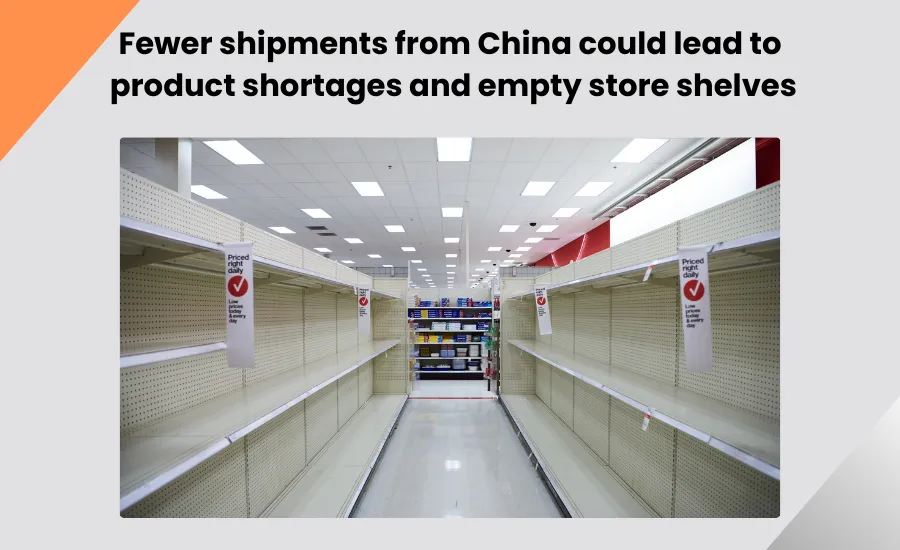China Shipping Slowdown Threatens Retail Inventory Crisis

Fewer shipments from China could lead to product shortages. Stores are warning that the U.S. market might once again see empty shelves and shipping problems like during COVID times if President Trump's China tariffs remain the same.
Companies have started canceling shipments from China and stopping new orders after Trump imposed a 145% tariff on nearly all china imports this month. Therefore, the number of cargo ships that were expected to arrive at the port of Los Angeles is set to be lower at 33%year-over-year for the week of; May 10, based on ship tracking data from Port Optimizer.
Usually, U.S. retailers would be increasing their orders for two key periods later this year: the back-to-school shopping season and the holiday shopping season.
And the slowdown is raising doubts about whether U.S. consumers will have the choice of products they're used to in the next few months.
"They're making their holiday buying decisions now," commented Jonathan Gold, vice president of supply chain and customs policy for the National Retail Federation. "It's a challenge for folks to figure out how to properly order and price with all the uncertainty that's out there on the tariffs."
As the current tariff rate, a U.S company would need to pay a minimum of $145 in tariff costs to Customs and Border Protection for importing an item worth $100 into the country.
That cost might eliminate any profit that a business would be earning and compel it to price its goods at a loss or increase prices to levels that consumers may not be able to pay.
Chinese sellers told NBC News that U.S. companies, including Target, have stopped placing orders. One seller who supplies press-on nails said her products are ready to go but are still sitting in China, and she doesn’t think she’ll ship anything to the U.S. in the first half of the year.
The National Retail Federation says imports could fall by 20% in the second half of the year if the current tariffs stay in place.
Chinese suppliers told NBC News this month that U.S. companies, such as Target, have suspended orders. One supplier who sells press-on nails to U.S. retailers said that her products are available to ship, but that they have been waiting in China. She doesn't think of sending any products to the United States during the first half of the year.
Some of the products most likely to vanish from store shelves during the next few months are lower-priced footwear, clothing, toys, and electronics have a high level of concentration in China, Gold stated. Other perishable goods coming from China, like apple juice and fish, have shorter shelf lives harder for retailers to stock.
Sean Stein on Fewer shipments from China
Sean Stein, president of the U.S.-China Business Council, said that just like during COVID, when we faced a shortage of toilet paper, and now we are going to start facing that with more and more goods. She also stated that we are going to have no stuff if the administration does not solve this problem until we have a shortage and hoarding, and it will be too late.
As quoted here: Product shortages and empty store shelves loom with falling shipments from China
The fear of empty shelves in stores has seemed to trigger alarm bells within the White House, rather than months of corporate warnings of increasing costs, according to an individual close to business lobbying campaigns on tariffs. Trump administration officials appeared especially concerned by a lack of products during holidays such as the Fourth of July and Christmas, the person added.
You may also like to read: Apple plans to make all US iPhones in India, Moving Away from China
After meeting with major retailers this week, Trump said on Wednesday that he’s considering lowering tariffs on China, although he has not taken any official action. On Thursday, he claimed that his administration had met with Chinese officials but earlier in the day, Chinese officials denied officially that there had been any formal trade discussions with the United States.
Whereas some merchants had been rushing imports from China prior to the tariffs, purchasing them some time to make it through the summer, that wasn't possible for most smaller companies that don't normally have the money or influence with their producers to increase levels of production.